I recently wrote about what happens when abusive parents homeschool. In this post I want to look specifically at cases when abusive parents start homeschooling in an effort to hide their abuse. In other words, these aren’t parents who start homeschooling for religious or educational reasons, or even because they like the control it gives them. These are parents who start homeschooling because there are abuse reports being made against them by their children’s teachers.
I’ll warn you once again: This won’t be fun to read.
Let’s start by looking at Calista Springer. Calista attended her local public schools until 2005, when her parents pulled her out of school to homeschool her after several child abuse complaints were registered against them.
Calista Springer lay tethered to her bed by a dog collar while her siblings went off to school each morning.
For two years, Springer’s parents claimed their eldest daughter was home-schooled, an assertion police now say was a ruse to hide child abuse.
That ruse came to a tragic end in February 2008, when fire swept through the Springer home, located across the street from the St. Joseph County Courthouse in downtown Centreville, a small town 35 miles south of Kalamazoo.
The 16-year-old died in the fire, unable to free herself from the strap that bound her to her bed.
…
There were no school books or educational materials found in the Springer home after the fire, according to a source familiar with the criminal case against the parents.
“Home school played a role in Calista’s death,” said prosecutor McDonough. “They basically eliminated any person who could have reported abuse, and the justification was the home school law.”
Legislators have not found a compromise to both protect those who might be abused and educational freedom.
“The Legislature should be able to reach some sort of middle ground, where everybody can agree (what) is in the best interest of the kids,” McDonough said.
“We’re not talking about parents who are educating their children — we’re talking about people taking advantage of the law to hide abuse.”
Next, here is an example from a recently published dissertation:
As an administration of a junior high school, I was aware of a seventh grade girl who struggled socially. Being quite close to a female teacher, she often confided in her that her home life was difficult. While living with her father in a grandmother’s home, conversations between father and daughter were often accompanied with body language that suggested abuse. As questions about this possible abuse were raised, the father responded by pulling his daughter out of public school and homeschooling. Threats were also made to the school that the Illinois State Board of Education would be called to report this school district’s mishandling of his daughter’s education. Since he worked full-time and seemed mentally unstable, I had concerns about the welfare of the child, but had little recourse.
We’ll follow this with a Wisconsin girl, who was pulled from public school after allegations of child abuse were raised. Years later, she finally escaped her severely abusive home.
A criminal complaint details years of alleged mistreatment, including denying the girl food, keeping her in a basement with an alarm system, choking and striking her.
“This has been going on for years,” assistant Dane County district attorney Matthew Moeser said.
The girl, now 15, was found by a passerby earlier this month as she walked in her pajamas and barefoot along a McFarland road. Authorities said the girl weighed 70 pounds.
The complaint states the girl’s face appeared sunken with her collarbones sticking out, and that she was”gorging” on food after authorities got her to care. The complaint states the girl gained 17 pounds in a matter of days.
According to the complaint, the girl told authorities Drabek-Chritton often denied her food, while Chritton claimed food would trigger diabetic reactions and render the girl prone to violence. Court documents state Drabek, two small children in the household, and Chritton and Drabek-Chritton would eat normally, while the girl would scavenge for food from garbage and go days at a time without eating. Her stepmother, Drabek-Chritton, was listed in court records as 370 pounds. Authorities said there was no evidence to support family claims of the girl’s alleged medical conditions, including eating disorders.
Finally, a boy in Colorado, who was physically abused by his adoptive father, was pulled out of school after abuse allegations were raised.
Suspicions about the single father’s treatment of the then-14-year-old arose in early 2008, soon after he enrolled the boy in Craig Middle School.
Among the warning signs reported to the Craig police officer assigned to the school were the boy’s sporadic attendance and his fearfulness around others, said police Cmdr. Bill Leonard.
In early 2009, the boy came to school with what appeared to be a black eye. The school officer and a Moffat County Social Services caseworker went to Lovato’s home and questioned him and his son, Leonard said.
“The father said the injury was from playing football, and the son backed that up,” Leonard said.
Before it went any further, Lovato took his son out of school, telling Moffat County School District officials he was going to home-school him.
“That got him under the radar,” Leonard said.
…
When there are suspicions of abuse, a sudden decision to remove a child from school can be a red flag, said Shirley Rhodes, El Paso County Child Protective Services administrator.
“The vast majority who home-school do it for the right reasons — religion, culture, education,” Rhodes said. “But in instances where there is abuse, there’s no opportunity for someone to see it or to question them.”
Note that in three of the four above cases, the abuse later came to light—Calista died in a fire because she was chained to her bed, the Wisconsin girl physically escaped the hell in which she was living and was found wandering by the side of a road, and the boy in Colorado eventually called the local sheriff’s office and reported his abuse. In the last case, that narrated by a public school administrator, the abuse may never come to light, and may instead fly under the radar indefinitely. It is impossible to know how many children are living this reality as I write.
A 2008 case in which four children were found dead in Washington, D.C., after being homeschooled for nearly a year prompted questions about homeschool regulations (of which the district had exactly zero). Discussion soon turned to abusive parents’ intentional use of homeschooling to remove their children from outside observation.
Clive R. Belfield, a professor of economics at Queens College and formerly a researcher at the National Center for the Study of Privatization in Education at Columbia Teachers College, said that “limited compliance and follow-up” gave abusive families “an excuse to get out of being observed.”
Mitchell L. Stevens, an associate professor of education and sociology at New York University, said school officials, who are required by law to report suspicion of child abuse, were society’s best watchdogs of how parents treat children.
“Home schooling removes children from a lot of that surveillance,” Mr. Stevens said, adding that the vast majority of home schooling families are “overwhelmingly trustworthy people who place a very high value on parental autonomy.”
Public officials in Washington, D.C., were so concerned about the potential for parents to abuse the district’s lax (read: nonexistent) homeschooling laws that they passed new homeschooling regulations in the wake of the case—the first time in fifteen years that any state (or in this case, district) had increased oversight of homeschoolers.
There have actually been at least three state task forces that have concluded that homeschooling played a role in children’s injury or death at the hands of their parents. These cases include an Akron, Ohio, case of child starvation (see this document for a description of this case and the task force report), a North Carolina case of a child’s death from suffocation (see the task force report here), and a Florida case of death due to abuse (see the task force report here). In the Florida case, young Nubia Barahona was removed from public school to be homeschooled following several child abuse allegations. A year and a half later, Nubia was dead. The resulting “Nubia Report” offered the following recommendation:
DCF should work with the school system and Department of Education to devise an efficient alert system, with appropriate follow-up inspections, for at risk children removed from the school system and placed in “home schooling.”
A state task force on child abuse in Pennsylvania made this same recommendation, which is why some Pennsylvania legislators are currently working to pass legislation that would result in increased monitoring of parents who choose to homeschool within eighteen months of having had a substantiated child abuse report made against them. No state currently has such a law. The Home School Legal Defense Association, in a perhaps not so stunning PR move, is opposing this legislation.
Under current law, homeschooling offers parents who are the subjects of child abuse complaints from their children’s schools to opt out and drop off the radar. And we know for a fact that this can and does happen.














